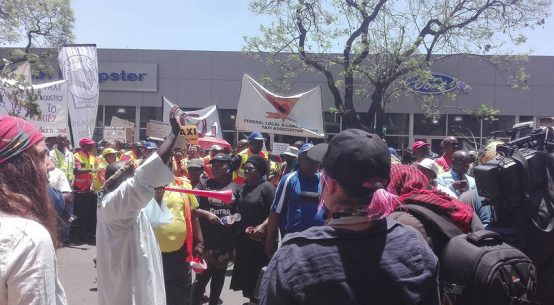
About five vessels bearing maize, ethanol and wheat estimated at over $37.9m have arrived at the Lagos and Tin Can Island ports.
According to information obtained from the Nigerian Ports Authority’s daily Shipping Position, a vessel, Cape Daly, arrived at the ABTL terminal on September 1 carrying 10,150 metric tonnes of ethanol worth $421,935.5 at the current market value of $41.57 per metric tonne.
On the same day, a vessel, Eike Oldendorff, arrived at the JosephDam terminal at the Tin Can Island port bearing 36,850MT of wheat valued at $5.7m
Another vessel, Diamond Harbour, arrived the country through the ENL terminal on September 5 with 25,750MT of maize worth $3.7m at the current market value of $144.29/MT.
Also berthing at the ENL on September 7 is a vessel named Zola carrying 42,900MT of maize valued at $6.1m.
Another vessel, Sealady, also arrived at JosephDam terminal on September 7 with 21,000MT of wheat valued at $3.2m, and with 13,000MT wheat valued at $2003,820.
In addition to these, a vessel, identified as Nord Express, had arrived at the GDNL terminal on August 31 bearing 46,050MT of wheat valued at $7.09m at the market value of $154.14/MT.
Poultry farmers say scarcity of the products in the local market pushed them into the importation of grains such as soya beans and maize used in poultry feed mill production.
Earlier in the second week of August, the JosephDam terminal took delivery of 33,000MT of wheat valued at $5.08m and 15,952MT valued at $2.4m.
Poultry farmers have blamed scarcity of the products in the local market for the increase in maize importation.
One of them who is the Group Head, Policy and Strategy, Amo Farm Sieberer Hatchery Limited, Mr. Toromade Francis, told a Punch correspondent that local farmers preferred to export grains and earn dollars than sell to local buyers.
He said this had pushed poultry farmers into importation of grains such as soya beans and maize used in poultry feed mill production.
Farmers under the aegis of the Nigerian Farmers Group and Cooperative Society have, therefore, urged the Federal Government to place a ban on maize importation.
The group’s National Coordinator, Redson Tedheke, said that the suspension of the importation would protect local farmers and encourage massive production of the commodity.
According to him, unchecked importation of maize remained a major threat to local production and President Muhammadu Buhari’s agricultural revolution drive.
He said local farmers must be protected to invest more so that Nigeria would become self-sufficient in maize production.
Tedheke noted that some agro-business firms operating in Nigeria were importing large quantities of maize at relatively low landing cost.
He added that the maize, which they eventually would sell for less thanN100,000 per metric tonne was crowding out local product sold for between N130,000 and N250,000 per metric tonne.
He said, “The Federal Government must set an immediate time scale to ensure that maize is not imported within months, like it’s done with rice.
“You cannot tell people to go to farm and then allow massive importation of the same thing they are conveniently producing.
“We feel that is insincerity of purpose, and we are telling government that if you allow continuous importation of maize, you are actually working against those you urge to go to the farm.”
According to Tedheke, the group has 2,000 hectares of maize farm across the nation and is still cultivating more.
Although maize is not currently on Nigeria’s import prohibition list, Tedheke maintained that there was a need to check excessive importation to protect local producers in their quest to grow the economy.
“If the Federal Government does not act fast, the localisation of maize production will be lost to importers who may kill local producers, jobs and the economy,” he said.








